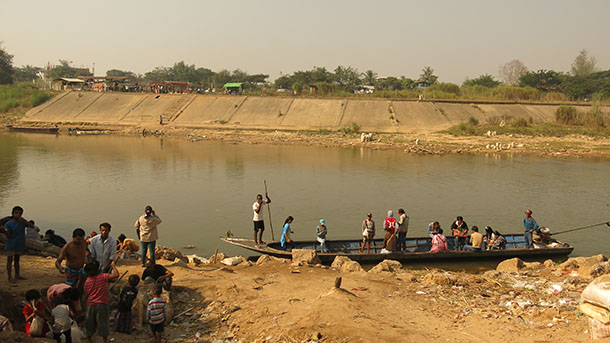CHIANG MAI, Thailand — Ferry transit at the Mae Sot-Myawaddy border crossing resumed on Tuesday, after the Karen State Border Guard Force (BGF) resolved a trade dispute with Thai authorities that had prompted the temporary closure of more than 20 jetties along the Moei River.
BGF General Secretary Col. Saw Chit Thu had closed the jetties in response to a Thai tightening of regulations on diesel and petroleum imports. The Karen BGF on Tuesday morning shut down eight main jetties under its control between Shwe Kokko and Minletpan villages at the Thai-Burma border, and more than a dozen smaller jetties were also closed.
Maj. Naing Maung Zaw, the personal assistant of Saw Chit Thu, told The Irrawaddy on Wednesday that Thai authorities had backed off a plan to limit fuel imports into Burma to the Mae Sot-Myawaddy Friendship Bridge, and the BGF allowed the resumption of water crossings at 5 pm on Tuesday.
“They coerced us into using the bridge to transport the fuel, which we had been transporting by ferry,” he told The Irrawaddy prior to the jetties’ reopening on Tuesday evening. “It seems that it was not a decision from the Thai central government, but a low-level [regulatory] group has done it for money. So, we closed the ferry gates so that the Thai central government knows about it.”
There are more than 20 jetties along the Moei River that provide water links between Mae Sot and Myawaddy in eastern Burma. The BGF-controlled jetties mainly handle imports of motorbikes and other vehicles, consumer goods and household materials.
Though the Mae Sot-Myawaddy Friendship Bridge is commissioned as an official transportation route between the two countries, trade has long relied on ferries because of bridge restrictions on vehicle weights.
Fuel prices have reportedly risen since the Thai attempt to tighten import regulations.
A Myawaddy local told The Irrawaddy: “It has been two or three days that fuel prices have been going up. Previously, a gallon of petrol was sold for 3,200 kyats [US$3.20] and today it is 4,300 kyats.”
“The shortage of fuel has affected the people in our region,” said Naing Maung Zaw, the BGF major. “The prices of other commodities will go up if the fuel prices increase. Thai authorities frequently tighten regulations against us. That’s why we have done so [closed the jetties].”
BGF troops under Saw Chit Thu accepted a government proposal in 2010 to transform themselves into a so-called Border Guard Force under the government’s control. The BGF is granted the right to control some border trade and businesses.
The group was a faction of the Democratic Karen Benevolent Army (DKBA) until 2010. The DKBA split from the Karen National Union (KNU) in 1994 and made peace with Burma’s central government in late 2011.

















